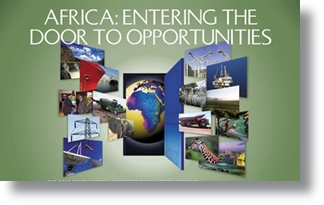Africa is a Growth Zone

 |
| Africa offers vast investment opportunities Photo courtesy |
As world leaders meet in New York to discuss the Millennium Development Goals (MDG); they should not fall in the trap of swaying both local and international capital away from Africa in a similar fashion Non Governmental Organizations, international media and policy makers have done in the last 5 decades. Perception is a very important asset for any country. It is time Africans shunned the negative orientation to its abilities that is generated by do-gooders keen to raise funds while riding on problems that afflict people on the continent. Africa presents a great opportunity of over a billion people to be fed, access information technology gizmos, travel (railways, roads, airports and sea ports and river-ports), housed, educated and treated of diseases, among others. MDG generated negativity stifles the ability of indigenous enterprises to raise funds to address challenges on the continent.
African government representatives must not misreport official statistics to simply gain donors’ favor. It is imperative that policy makers in Africa focus on developing transparent measurements, record keeping and information sharing in order to motivate both local and international investors.
Africa can learn from the recent economic debacle that befell some European countries; especially Greece. Observers indicate that among other reasons, Greece’s financial crisis was caused by misreporting its official economic statistics. Although the country enjoyed boom time and feel good factor in the short run, it later plunged its sovereign bond into junk status.
To develop and attract investors, African countries must invest heavily in the continent's statistical and analytics gathering systems. Investors need information in order to make decisions. This cannot happen if information is either missing or inaccurate. If the continent has to achieve genuine development goals, citizens must be able to articulate in clear terms what they want, like and dislike. It is through structured and efficient citizen participation that the wheels of development will get oiled.
Developed and re-emerging economies are both looking to Africa for natural resources and markets. Africa ought to offer an additional opportunity – that of growth. Developed nations faced with the threat of “zero growth” should grow through investing in Africa. The traditional aid initiatives to the continent will swing zero-growth-economies to stagnation because of investing in growing burdens (aid dependency) as opposed to solutions. Transparent interaction between the developed, re-emerging economies and Africa will lead to knowledge driven initiatives (not synonymous to PhDs, but simply having an understanding of how the world works!)
The way to go for Africa is to focus on growing a constituency of small and medium sized enterprises that can rapidly deploy against the numerous challenges that face the continent. Armed with accurate data, such enterprises can access financing from banks and other investment initiatives. Financing agencies will readily back them up if the continent’s governance structural system is stable and predictable. Stable governments that allow people participation in turn will offer services to the citizenry. The quest to achieve MDGs therefore ought not to transform the continent into some huge NGO. Leaders in New York should declare Africa a growth zone and persuade their International NGOs and journalists to frame the continent as such.
By James Shikwati.
The author james@irenkenya.org is Director of Inter Region Economic Network
